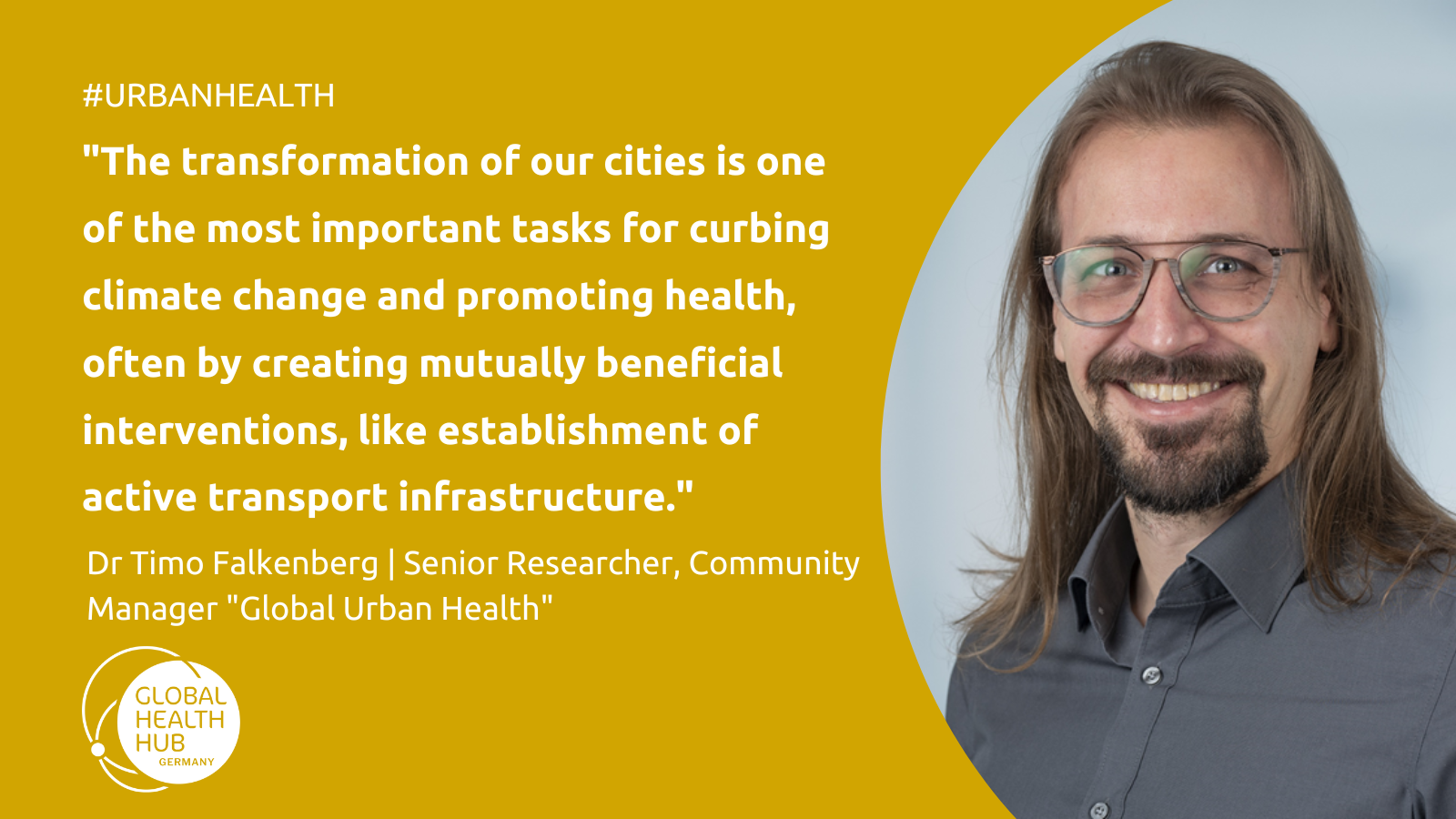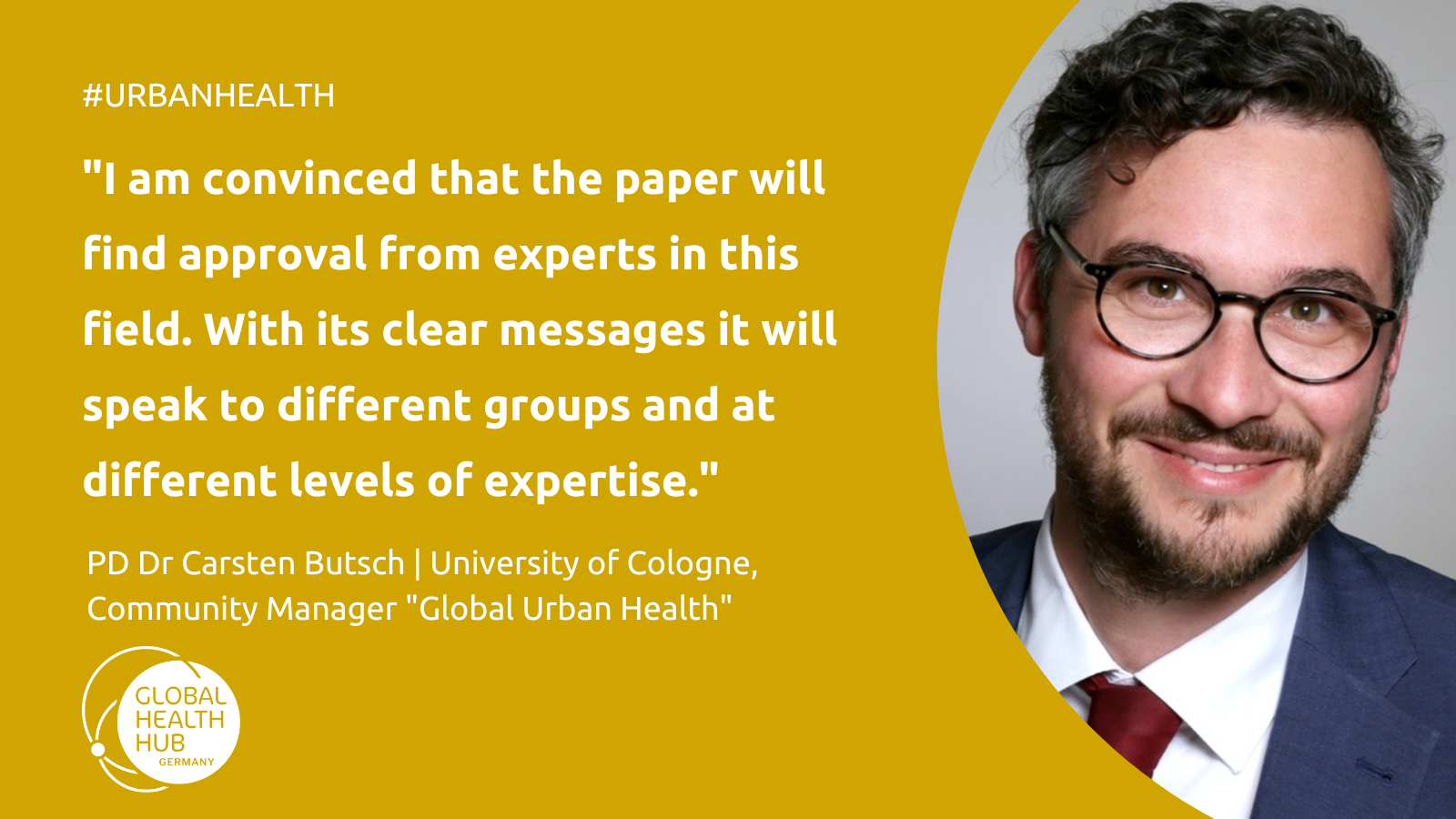Urban Health: Interview with Dr. Carsten Butsch and Dr. Timo Falkenberg
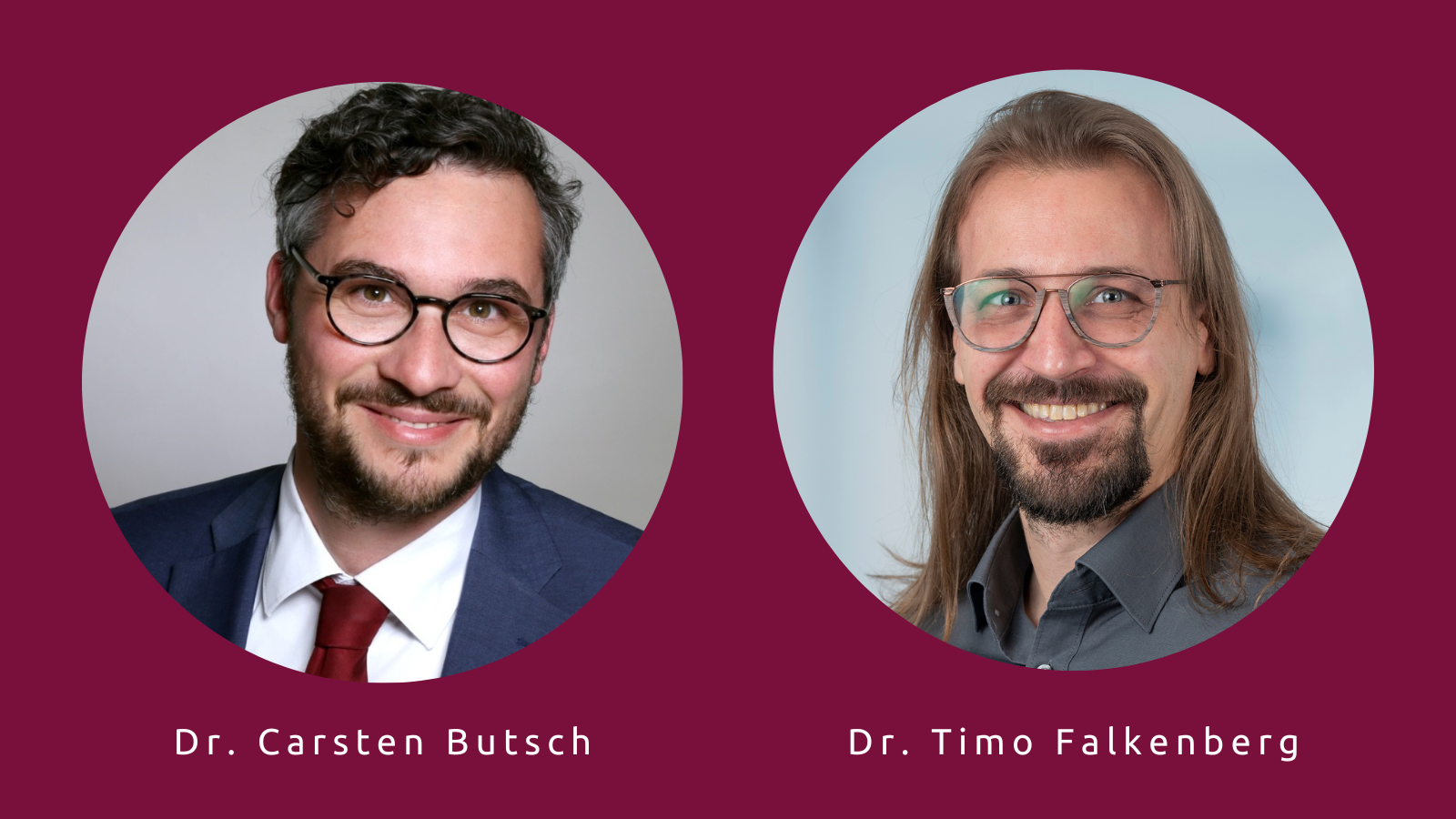
We interviewed Dr. Carsten Butsch (University of Bonn) and Dr. Timo Falkenberg (University of Bonn), both co-manager of the Hub community "Global Urban Health", about the new policy brief on Urban Health.
Congratulations on your Hub Community’s first public product! As the leaders of the Global Urban Health Community, what motivated you personally to invest the time and effort in engaging the group to draft a paper?
Carsten: For me, personally, I was motivated to create awareness about urban health as a field for research and action. Already in my PhD thesis I worked on urban health, investigating access to healthcare in urban India. Back then I experienced that many experts I talked to were not aware of urban health problems – especially in the Global South the discourse in the last decades on improving health systems focused on improving rural healthcare systems. This is for sure important, but with the ongoing urban transformation in most countries of the Global South urban health, especially the health of those marginalised groups living in “slums” or “squatter settlements” has not been ranking too high on the political agenda. When the group on Global Urban Health came together in the GHHG, we experienced that urban health is a problem of global concern, even if the problems differ in countries with high and low income. But the work on drafting the paper was very fruitful and stimulating. Thus, it was both the product, with the goal to put urban health on the agenda and the process that motivated us over the last two years.
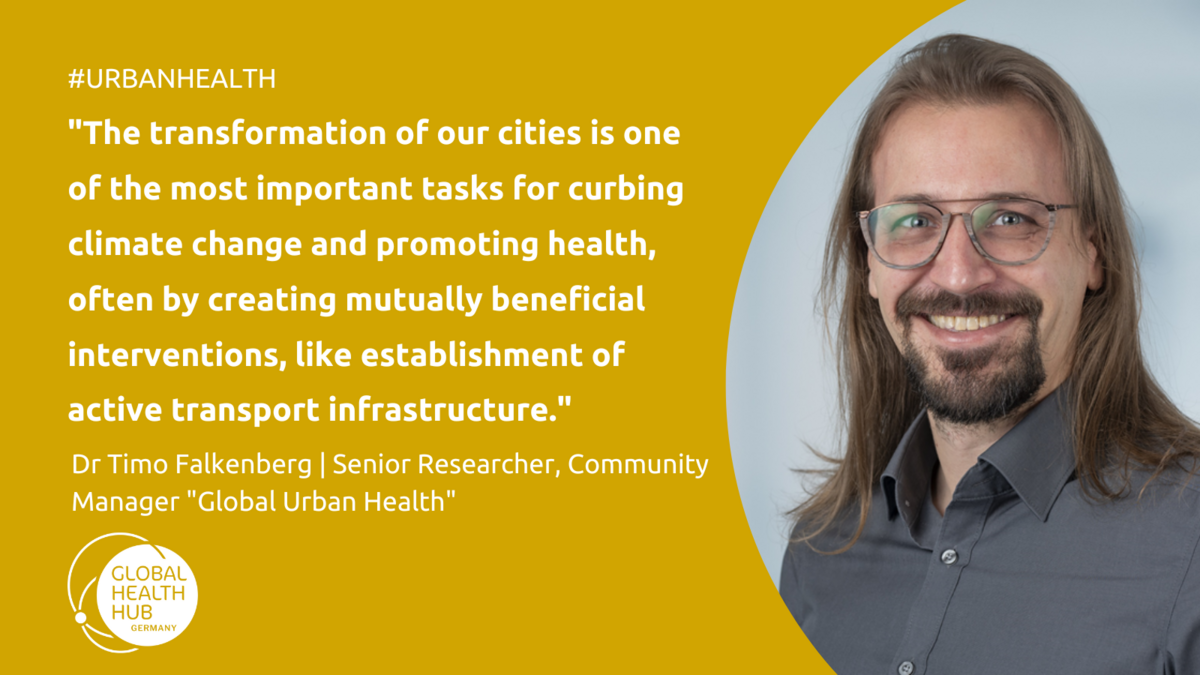
Timo: I have been interested in urban transformation processes since my master’s degree and believe that sustainable healthy cities are of upmost importance for the 21st Century. However, most development research and programs are focused on rural areas, as urban areas are already viewed as more prosperous. Humans are largely living in cities and the urban population share is continuously rising. Still, urban health is not a policy priority and also specific research funding is lacking. My key motivation to join the group was to raise awareness of the urban health problems we are experiencing worldwide. Additionally, I enjoy connecting with a diverse group of people that are also passionate about urban health, and work with them. In my view the transformation of our cities is one of the most important tasks for curbing climate change and promoting health, often by creating mutually beneficial interventions, like establishment of active transport infrastructure.
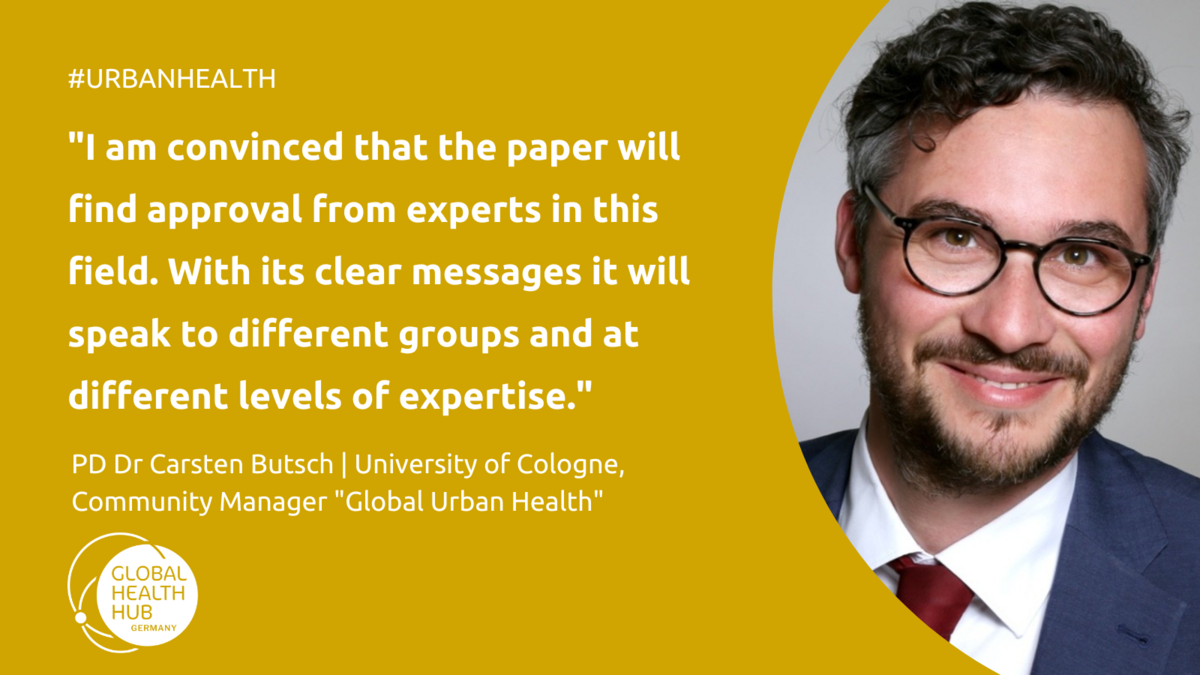
Who should read your paper and what do you hope will change as a result of the paper?
Carsten: The paper was written with a broad audience in mind and I think that different stakeholders will find relevant messages in it. Local planners hopefully find ideas that inform their actions on the local levels; civil society organizations hopefully recognize their responsibility as multiplicators of health knowledge and creators of health resources – if health organizations are conscious about their role, they may actively create health as a co-benefit of their valuable work; we hope that leaders from the economy accept their responsibility for preserving healthy urban environments; politicians hopefully understand the urgent need for shaping healthy urban environments through a series of shifts in frameworks – it is easy to harvest some low hanging fruits that have a huge impact on human health with little cost; we hope that persons in international organizations put urban health on their agenda; finally, as a researcher I hope that research funding organizations will understand the urgency of this complex and under-researched topic and develop funding lines.
I am convinced that the paper with its clear messages will find approval from experts in this field. With its clear messages it will speak to different groups and at different levels of expertise.
Tell us about the process of drafting a paper with such a diverse group of stakeholders. How did you manage to get your group to contribute to the paper? What where the major challenges and how did you overcome them?
Timo: A key factor of success was the development of a joint vision and group cohesion. We achieved this with a series of virtual brown-bag lectures that gave each member of the Community the opportunity to present their field of interest within urban health and include key messages important for our policy brief. This process not only ensured that the members got to know each other and their particular expertise but also a list of key messages organically formed. Overall, the consensus building process worked quite well, as there was already prior agreement on the most central aspects. The most challenging aspect was time availability, as all Community members contribute voluntarily and thus had to find time next to their already busy schedules. By enabling asynchronous editing and commenting in a shared document and allowing rather long periods for providing feedback this challenge could partially be overcome. Often not all members were able to attend our online meetings, so it was important to circulate short meeting notes to keep everybody up to speed. I think an important aspect that kept everybody motivated was the determination of the core author group and the general belief in the necessity for such a policy brief.
What are the key lessons you have learnt from this process?
Carsten: On the positive side: First, it is possible to bring a group of highly motivated experts together and jointly work together towards a common product. Second, it is important to have a joint goal to keep a diverse group together. Third, even if the paper reflects broad discussions and the diverse input, someone needs to take the lead and take decisions.
On the negative side: It takes longer than expected to finalise a product if there are no hard deadlines and in a group of volunteers one will always experience dropouts.
What are the next steps for your Community and who would you like to see participate?
Carsten: The policy brief marks for me the end of a working cycle in the Community. During the process it got increasingly different for newcomers to join the group as the product was already taking shape. Thus, I hope that the paper will attract new persons to join the group and that we will use the Community Day in June to set a new goal for a next working cycle of 12 to 24 months. One possible direction could be to initiate a new series of dialogues, for example with local urban planners or to start further work on the idea of “city diagnosis” to translate this so far abstract idea into a concrete framework or manual.
Timo: With this policy brief we have achieved an important milestone for the Community. We have worked on this for quite some time now and all of our attention has been focused on finalizing it. Now we are looking towards Community Day in June to formulate our new goals and hopefully gain new members. What exactly will be our next steps needs to be decided in discussion with the entire Community but I do think that we will build on the current policy brief and work towards operationalizing some of the demands voiced in the paper. A very central element is “city diagnosis”, which we view as essential for effective health-promoting urban development. It is now important to translate our recommendations into actionable measures, maybe by developing guiding manuals or collecting best-practice case studies. There are still many open questions about how cities can transform for health and sustainability and in the Global Urban Health Community we are determined to contribute to the answers.
Read the new policy brief now!
Image source Dr. Timo Falkenberg: Rolf Müller, UKB
Image source: Dr. Carsten Butsch: Fotoatelier Herff
